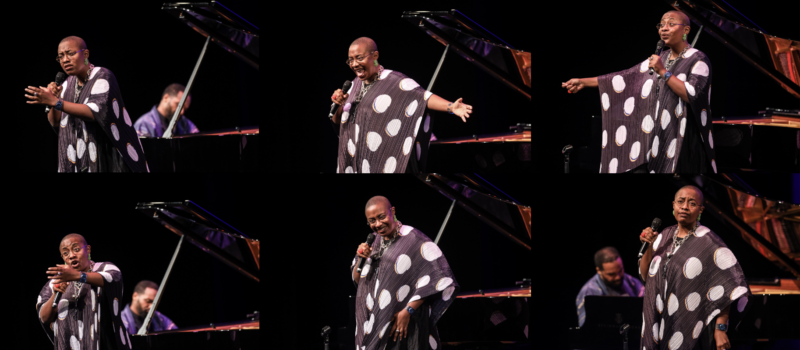Cécile McLorin Salvant may have just made her best record. It could be, at least, her most consistent record — consistently surprising if not consistently great. Listener opinions will of course vary, but this writer is very nearly willing to proclaim greatness. Oh Snap is certainly, in any event, her most endearing album, and that’s no faint praise.
Prior to the new album, she wrote and staged a mythic one-woman opera about an ill-fated attempt to seduce a flesh-eating forest monster, and wrote and recorded a song cycle about a woman who turns into a snake on Saturdays. Both projects are sung in both English and French. Salvant was already full of surprises, but the latest twist in her path turns out to be a near-perfect pop album.
Oh Snap isn’t altogether a pop album in style, although it does broach the form. It’s arguably, however, a pop album in substance. It’s a pop album in the sense of indulgence, in the projection of personality.
It’s an album of revelation and self-reflection of the sort that pop singers and songwriters have traded in for decades — the ethereal elevation of ego that makes appreciation turn to love among fans of an ilk that includes John Lennon, Joni Mitchell, Nina Simone and, more recently, Olivia Rodrigo and the reigning queen of confession and confrontation, Taylor Swift — not to mention scores of less inherently interesting singers.
Their records rely on listener adulation; the payoff requires that the artist is able to pull off the feat of making you think you know them (and even that they know you). Salvant is, shall we say, more sublime than most. She’ll make you fall in love, at least for half an hour. She makes the game work.
The songs on Oh Snap began as experiments, exercises and amusements, recorded on her phone, edited and augmented on her laptop. She learned the tech as she went along, then took them into the studio, retaining at least some of the impulses of her creations. There’s humor and charm and sadness and sentiment and introspection throughout. None of the songs are all that long, and none are at all hurried.
The album opens with a statement of self. “I want to be a river, but I am a volcano,” she sings in an electro-ballad that echoes Björk and Kate Bush. (Salvant has expressed admiration for the former and covered the latter.) It’s followed by a clever ditty that could easily be a show tune (“I spend a lot of time thinking about doing things instead of doing them […] thinking about anything but now”).
Salvant delivers that one with a sly, Blossom Dearie lilt and a tight jazz trio featuring her stalwart pianist Sullivan Fortner. “Take This Stone” is an allegorical folk song over acoustic guitar figures with Kate Davis and June McDoom vocal harmonies. “What Does Blue Mean to You?” is infectious and clever, something like Annie Ross singing Ken Nordine. If the setup of the song obscures the Toni Morrison inspiration, the bloodcurdling refrain comes through and rings true.

The title track is a love song of uninhibited devotion in both directions: forthright, heartfelt and funny, with heavy vocal processing. The second half has a couple more ballads and eventually pushes the electronics fully into dancefloor territory before resolving in a sound collage inspired by a Bashō haiku.
It’s an eclectic album without a doubt — a self-portrait of a girl who grew up in Miami avidly listening to the Backstreet Boys and exposed to classical and grunge records and folk music from around the world. Oh Snap is a cosmopolitan album born of a multicultural upbringing.
About a third of the way into it lies a cover of the 1977 Commodores hit “Brick House” sung by Salvant and Fortner, an impromptu 27 seconds that dissolves in laughter, presumably included as testament to their love of making the album and of working together. It’s a pure pop move, allowing us to triangulate on the album and, in so doing, its maker.
It’s a reveal, a glimpse of who this girl of Haitian and French parentage out of Miami turned out to be. It’s not the masterful vocalist, three-time Grammy winner and MacArthur Fellow bringing new personality to old idioms. Not this time. It’s the brick house, and she’s letting it all hang out. JT
